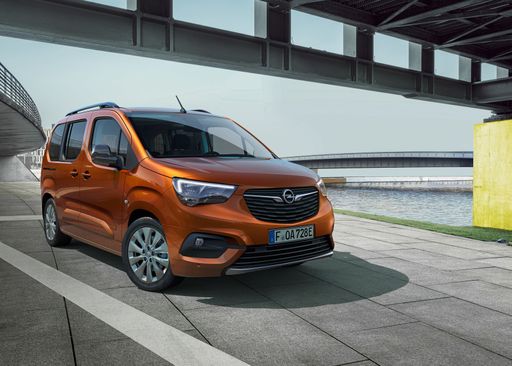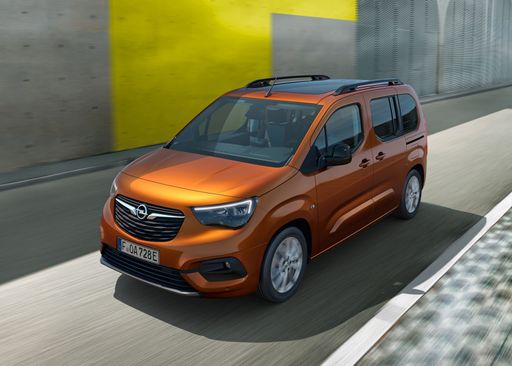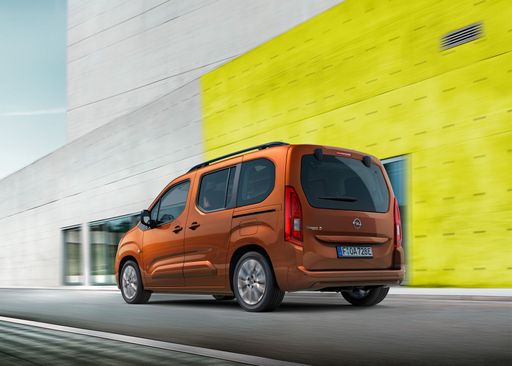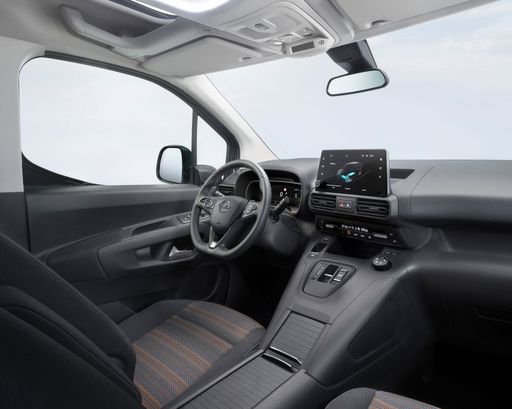Mercedes Sprinter Bus vs Vauxhall Combo – Differences & prices compared
Compare performance, boot space, consumption and price in one view.
Find out now: which car is the better choice for you – Mercedes Sprinter Bus or Vauxhall Combo?
The Mercedes Sprinter Bus (Bus) comes with a Diesel engine and Manuel or Automatic transmission. In comparison, the Vauxhall Combo (High Roof Estate) features a Electric or Diesel engine with Automatic or Manuel transmission.
When it comes to boot capacity, the Mercedes Sprinter Bus offers , while the Vauxhall Combo provides 850 L – depending on how much space you need. If you’re looking for more power, decide whether the 190 HP of the Mercedes Sprinter Bus or the 136 HP of the Vauxhall Combo suits your needs better.
In terms of consumption, the values are 9.30 L per 100 km for the Mercedes Sprinter Bus, and 18.50 kWh5.50 L for the Vauxhall Combo.
Price-wise, the Mercedes Sprinter Bus starts at 41400 £, while the Vauxhall Combo is available from 24000 £. Compare all the details and find out which model fits your lifestyle best!
Mercedes Sprinter Bus
The Mercedes-Benz Sprinter Bus stands out as a versatile option for those seeking both comfort and practicality in a people mover. Its spacious interior design ensures ample room for passengers while maintaining a smooth and efficient driving experience. With its advanced safety features and modern amenities, the Sprinter Bus continues to be a leader in its class.
detailsVauxhall Combo
The Opel Combo high-roof estate car stands out for its impressive versatility, making it an ideal choice for both families and professionals. Its spacious interior and clever storage solutions ensure a comfortable ride and plenty of room for all your needs. With a focus on practicality and efficient design, the Combo seamlessly combines functionality with modern driving technology.
details @ media.stellantis.com
@ media.stellantis.com
 @ media.stellantis.com
@ media.stellantis.com
 @ media.stellantis.com
@ media.stellantis.com
 @ media.stellantis.com
@ media.stellantis.com

|
|
|
|
|
Costs and Consumption |
|
|---|---|
|
Price
41400 - 55900 £
|
Price
24000 - 36500 £
|
|
Consumption L/100km
9.3 - 12.3 L
|
Consumption L/100km
5.5 - 5.9 L
|
|
Consumption kWh/100km
-
|
Consumption kWh/100km
18.5 - 18.8 kWh
|
|
Electric Range
-
|
Electric Range
333 - 345 km
|
|
Battery Capacity
-
|
Battery Capacity
-
|
|
co2
244 - 322 g/km
|
co2
0 - 155 g/km
|
|
Fuel tank capacity
71 L
|
Fuel tank capacity
53 L
|
Dimensions and Body |
|
|---|---|
|
Body Type
Bus
|
Body Type
High Roof Estate
|
|
Seats
2
|
Seats
5 - 7
|
|
Doors
4
|
Doors
4 - 5
|
|
Curb weight
2356 - 2559 kg
|
Curb weight
1530 - 1922 kg
|
|
Trunk capacity
-
|
Trunk capacity
597 - 850 L
|
|
Length
5932 - 6967 mm
|
Length
4410 - 4760 mm
|
|
Width
1993 mm
|
Width
1848 mm
|
|
Height
2633 - 2659 mm
|
Height
1812 - 1818 mm
|
|
Payload
814 - 1144 kg
|
Payload
430 - 840 kg
|
Engine and Performance |
|
|---|---|
|
Engine Type
Diesel
|
Engine Type
Electric, Diesel
|
|
Transmission
Manuel, Automatic
|
Transmission
Automatic, Manuel
|
|
Transmission Detail
Manual Gearbox, Automatic Gearbox
|
Transmission Detail
Manual Gearbox, Automatic Gearbox
|
|
Drive Type
Rear-Wheel Drive, All-Wheel Drive
|
Drive Type
Front-Wheel Drive
|
|
Power HP
114 - 190 HP
|
Power HP
102 - 136 HP
|
|
Acceleration 0-100km/h
-
|
Acceleration 0-100km/h
11.30 s
|
|
Max Speed
150 - 159 km/h
|
Max Speed
135 - 184 km/h
|
|
Torque
300 - 450 Nm
|
Torque
250 - 300 Nm
|
|
Number of Cylinders
4
|
Number of Cylinders
4
|
|
Power kW
84 - 140 kW
|
Power kW
75 - 100 kW
|
|
Engine capacity
1950 cm3
|
Engine capacity
1499 cm3
|
General |
|
|---|---|
|
Model Year
2024 - 2025
|
Model Year
2024
|
|
CO2 Efficiency Class
G
|
CO2 Efficiency Class
A, E
|
|
Brand
Mercedes-Benz
|
Brand
Vauxhall
|
Mercedes Sprinter Bus
The Mercedes-Benz Sprinter Bus: A Revolution in Transport
The Mercedes-Benz Sprinter Bus has long been a symbol of efficiency and reliability. Renowned for its versatility and performance, Mercedes-Benz continues to push boundaries with its latest models, catering to the needs of businesses and individuals alike. Whether used for passenger transport or as a corporate shuttle, the Sprinter Bus offers an exceptional driving experience, combining innovative technology with superior comfort.
Engineering Excellence: Under the Bonnet
At the heart of the Mercedes-Benz Sprinter Bus is its robust engine lineup, offering power outputs ranging from 114 PS to an impressive 190 PS. These variants ensure that there is a model suitable for every requirement, whether you need efficient city commuting or robust highway cruising.
The Sprinter Bus is equipped with either a manual or automatic transmission, providing flexibility to suit different driving preferences. The sophisticated 9G-TRONIC automatic gearbox represents a pinnacle of automotive engineering, ensuring smooth and efficient gear changes, which enhance the overall driving experience.
Performance and Efficiency: Meeting Environmental Standards
The Sprinter Bus's diesel engines are not just about power; they also focus on fuel efficiency, with consumption figures between 9.3 L/100km and 12.3 L/100km. The inclusion of start/stop technology helps in reducing fuel consumption, thus making it more economical and environmentally friendly.
Mercedes-Benz shows its commitment to sustainability by ensuring all engine options comply with stringent emissions standards. The models provide a CO2 efficiency class of G, underlining the brand's dedication to creating vehicles that are as kind to the planet as they are to your pocket.
Design and Comfort: Where Function Meets Style
The design of the Mercedes-Benz Sprinter Bus effortlessly combines functionality with aesthetics. The interior space is crafted to provide maximum comfort for passengers, while the exterior design leaves a lasting impression with its sleek lines and authoritative presence.
The Sprinter Bus can accommodate up to nine seats, making it ideal for passenger transport. Options such as air conditioning, advanced infotainment systems, and ergonomic seating ensure a pleasant experience for both driver and passengers, even on long journeys.
Safety and Technology: Prioritising Your Well-being
The Sprinter Bus offers a suite of advanced safety features aimed at keeping occupants safe, including adaptive cruise control, lane keep assist, and crosswind assist. These features are integrated with cutting-edge technology, such as the Mercedes-Benz User Experience (MBUX) system, which enhances connectivity and user interaction.
With rear-wheel drive and optional all-wheel drive capabilities, the Sprinter Bus is equipped to handle a variety of terrains and weather conditions, providing reassurance for every journey.
The Future of Transport: Innovative Options
Mercedes-Benz demonstrates their innovative edge with customisation options tailored to various business needs, be it for luxury transport or robust utility. Additionally, the Sprinter Bus's load capacity ranges from 814 kg to 1,249 kg, ensuring businesses can meet their logistical needs efficiently.
As demands for sustainable transport solutions grow, the Sprinter Bus is positioned as a forward-looking vehicle that blends traditional Mercedes-Benz quality with modern innovations.
The Mercedes-Benz Sprinter Bus is more than just a vehicle; it is an investment in exceptional performance and unmatched adaptability, engineered to meet the diverse demands of today's transport sector. From its powerful yet efficient engines to its state-of-the-art technology and safety features, the Sprinter remains a leader in its class.
Vauxhall Combo
A Revolutionary Take on Family Transport
The Opel Combo Hochdach-Kombi stands out as a versatile solution in the ever-evolving landscape of family vehicles. With a focus on practicality and innovative design, this model offers significant improvements in efficiency and user experience.
Technical Specifications at a Glance
The latest Opel Combo represents a leap forward in electric vehicle technology. With an efficient electric motor delivering 136 PS (100 kW) and a 0-100 km/h time of 11.3 seconds, it's built to combine performance with sustainability. A notable feature is the impressive range, spanning from 333 km to 345 km, making it a reliable choice for both urban commuting and longer journeys.
Space and Versatility Redefined
Flexibility is key with the Combo's design. Available in configurations accommodating 5 to 7 seats, the interior space is complemented by a generous boot capacity ranging from 597 litres to 850 litres. This ensures ample room for family and gear, without compromising on comfort. The tall roofline and clever interior design maximize passenger headroom and storage options.
Innovations in Efficiency
Powered by a modern electric powertrain, the Combo achieves a consumption rate between 18.5 and 18.8 kWh/100 km. This meticulous balance of power and efficiency results in zero CO2 emissions, positioning the vehicle firmly within the A CO2-efficiency class. Front-wheel drive (FWD) ensures stability and handling confidence, aided by a sophisticated automatic transmission system.
Cost and Economy
With a price range from €38,600 to €42,600, the Combo offers a competitive entry into the electric vehicle market. Factor in the cost savings associated with electric motoring, such as reduced maintenance and fuel costs, and the Combo rapidly establishes itself as a wise investment for the eco-conscious driver.
Design and Aesthetic Appeal
The Combo’s exterior length spans between 4410 mm and 4760 mm, providing a balanced profile that combines practicality and style. Available in several stylish trims — including Edition, GS, and options for either five or seven-seater models — the Combo is adept at catering to a range of stylistic preferences and needs.
Conclusion: A Future-Ready Choice for Families
The Opel Combo Hochdach-Kombi captures the spirit of modern motoring needs, offering a sustainable, spacious, and affordable solution for families. With technological advancements that enhance both performance and efficiency, it strongly represents the future of transportation, making it an ideal choice for those looking to transition to electric driving without compromising on practical needs.
The prices and data displayed are estimates based on German list prices and may vary by country. This information is not legally binding.
